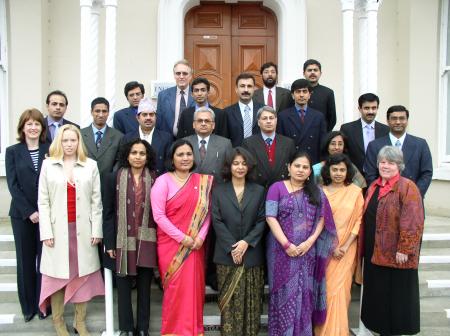
network of research and training centres/programmes
South Asians complete conflict resolution course
Twenty south Asian professionals active in peace and conflict resolution have completed a three-month training programme with International Conflict Research at the University of Ulster in Northern Ireland.
 |
|
Conflict
resolution course participants from south Asia are pictured |
University Vice-Chancellor Gerry McKenna hosted a farewell event for the group where he presented each member with a certificate marking the completion of the course. "We have been privileged to host such a dedicated and professional group and hope that the shared learning experience you have gained here in Northern Ireland will have a positive impact on conflict resolution in south Asia," Prof. McKenna said.
The groups comprised members of
parliament, academics, civil servants, journalists, NGO workers and
members of civil society from Bangladesh, India,
The programme involved a mixture of seminars, workshops, role play situations and guest lectures by prominent policymakers, practitioners and academics active in peace and conflict issues internationally. Comparative and shared learning was a core component of the methodology employed.
Among those who spoke with the group were Prof. John Hume, 1998 Nobel Laureate and former Social Democratic and Labour Party (SDLP) leader; Fine Gael MEP John Cushnahan; Lord Alderdice, member of the International Monitoring Commission and until recently Speaker of the NI Assembly; and Councillor Eoin Obroin of Sinn Féin.
Members of the group conducted
field visits to
The programme was funded under the British Council’s Chevening Scholarship scheme. It aimed at exposing professionals working in a variety of contexts to the Northern Ireland peace process and to best practice in conflict resolution.
"This programme has
confirmed the importance of working regionally, since conflicts
nowadays are not confined to individual countries," said
programme co-ordinators Steve and Sue Williams. "It
has also demonstrated the usefulness of
![]()
STOP SPAM! Javascript-enabled browser is required to send email.
Copyright © 2004 United Nations University. All rights reserved.